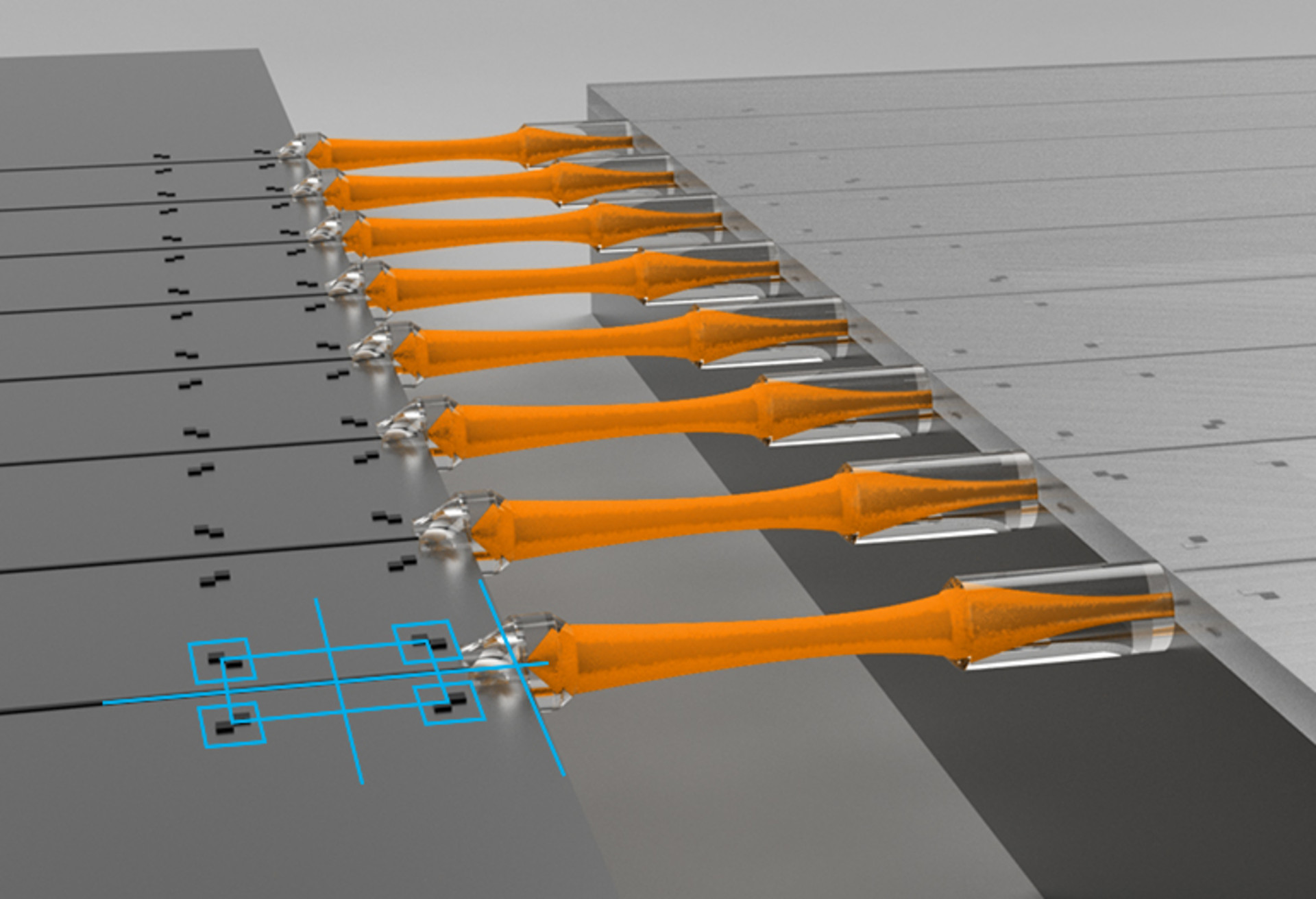
Inventing tomorrow's technologies
We empower cutting edge science and drive industrial innovations
The next generation
of 3D Microfabrication
Nanoscribe works closely with high-tech companies and partners from research institutes and universities in various research and development projects. Based on its expertise in high-precision additive manufacturing, Nanoscribe’s technology empowers cutting-edge engineering to enable innovative technologies and novel applications.
Nanoscribe develops key industrial applications together with its partners and experts. The R&D projects focus on ground-breaking technologies that range from mobile imaging devices to quantum technologies and integrated photonics. These innovations make smart devices possible and open up useful applications, for example in health care, automotive, sensors and data communications.
Our current research and development projects focus on integrated photonics and microoptics. Find out more about the research projects we are working on:
- MiLiQuant
- HandheldOCT
- PHOENICS
- OptoGlass3D
- PRINTOPTICS
MiLiQuant
Photonics packaging for quantum-based imaging

With its technology expertise in 3D Microfabrication, Nanoscribe participates in the research project MiLiQuant. The aim of the project is to produce largely alignment- and maintenance-free radiation sources for industrial applications. This is a promising technology for sensors in medical diagnostics or autonomous driving as well as quantum-based imaging processes for medical technology.
The project is funded by the German Federal Ministry of Education and Research (BMBF). The project consists of a team with six partners: Besides Nanoscribe, the companies Q.ant, Zeiss, and Bosch as well as the Johannes Gutenberg University Mainz, and the University Paderborn develop miniaturized, frequency- and power-stable diode lasers.
HandheldOCT
Mobile medical imaging
for point-of-care diagnostics

HandheldOCT is a Horizon 2020 research project, in which scientists and engineers from universities, research institutes and companies develop a handheld imaging device for mobile eye examination. Based on low-cost and miniaturized integrated photonic chip technology, the project partners investigate on novel and compact imaging devices. To expand optical coherence tomography (OCT) in the diagnosis and treatment monitoring of widespread eye diseases from clinical to mobile use, these portable imaging devices are a key enabling technology.
Nanoscribe’s partners of the Horizon 2020 research project are the Medical University of Vienna, Tyndall National Institute, imec, AIT Austrian Institute of Technology GmbH, Innolume GmbH and Carl Zeiss AG.
PHOENICS
Alignment and photonics packaging
for optical computing

PHOENICS is a European research project with the goal of establishing disruptive methods for ultrafast information processing required for artificial intelligence (AI) applications. The information processing architecture is based on the hybrid integration of different chip platforms. A key challenge for the industrialization of photonically packaged systems is the wide variety of photonic platforms which typically all have various optical coupling interfaces with different optical properties. Nanoscribe will deploy Quantum X as its hardware framework and is collaborating to establish an advanced platform as the industry standard for next-generation photonics packaging.
In the Horizon 2020 research project, Nanoscribe is a project partner in a network of a total of nine European companies and research institutes.
More info about PHOENICS
Advances in integrated photonics

Joint innovation project with these partners:
- Q.ant GmbH
- Robert Bosch GmbH
- Carl Zeiss AG
- Nanoscribe GmbH & Co. KG
- Johannes Gutenberg University Mainz
- University of Paderborn

Joint innovation project with these partners:
- Medical University of Vienna
- Tyndall National Institute
- imec
- AIT Austrian Institute of Technology GmbH
- Innolume GmbH
- Carl Zeiss AG
- Nanoscribe GmbH & Co. KG

Joint innovation project with these partners:
- University of Münster
- University of Exeter
- École polytechnique fédérale de Lausanne (EPFL)
- Nanoscribe GmbH & Co. KG
- University of Oxford
- Heinrich Hertz Institute of the Fraunhofer Gesellschaft
- Ghent University
- IBM Research GmbH
- MicroR Systems
OptoGlass3D
3D Microfabrication of optical glasses

Within the European research project OptoGlass3D, Nanoscribe and its project partner Glassomer GmbH develop a key microfabrication technology for printing optical elements consisting of fused silica glasses. In a joint approach, the core technologies of the two project partners drive the 3D Microfabrication of glass parts and structures. The whole additive manufacturing process is developed on Nanoscribe’s 3D Microfabrication technology, based on Two-Photon Polymerization, which is combined with Glassomer’s glass shaping technology.
To validate the technological achievements, the project team will showcase the manufacturing of fused silica glass components. In addition, the project partners will demonstrate the tunability of optical properties required for future applications in imaging, sensing, and photonics.
PRINTOPTICS
Printing miniaturized optics on fibers

In the BMBF funded research project PRINTOPTICS Nanoscribe is driving the printing of miniaturized optics on fiber. Nanoscribe’s 3D Microfabrication facilitates to print extremely filigree, high-performance optics directly onto approximately 500 µm thin glass fibers. Moreover, thanks to Nanoscribe’s technology, the microoptics can be 2.5D or even complex 3D compound structures, as well as hybrid optics. The project thereby also aims to develop innovative solutions for the mass production of endoscopic miniature systems.
Nanoscribe’s project partners are the 4th Physics Institute and the Institute of Applied Optics (both University of Stuttgart) as well as Karl Storz, a medical technology company.
Cutting-edge microoptics research

Joint innovation project with these partners:
- Glassomer GmbH
- Nanoscribe GmbH & Co. KG

Joint innovation project with these partners:
- Karl Storz GmbH
- Nanoscribe GmbH & Co. KG
- University of Stuttgart

